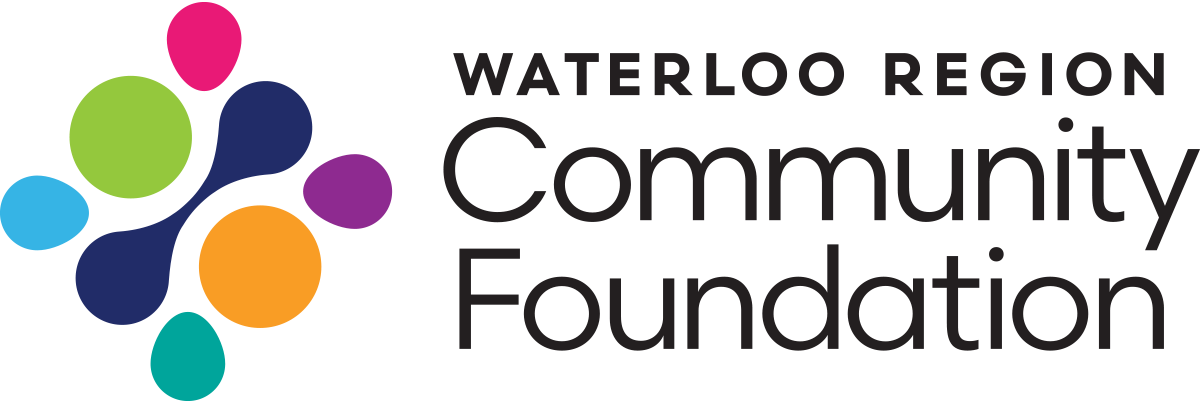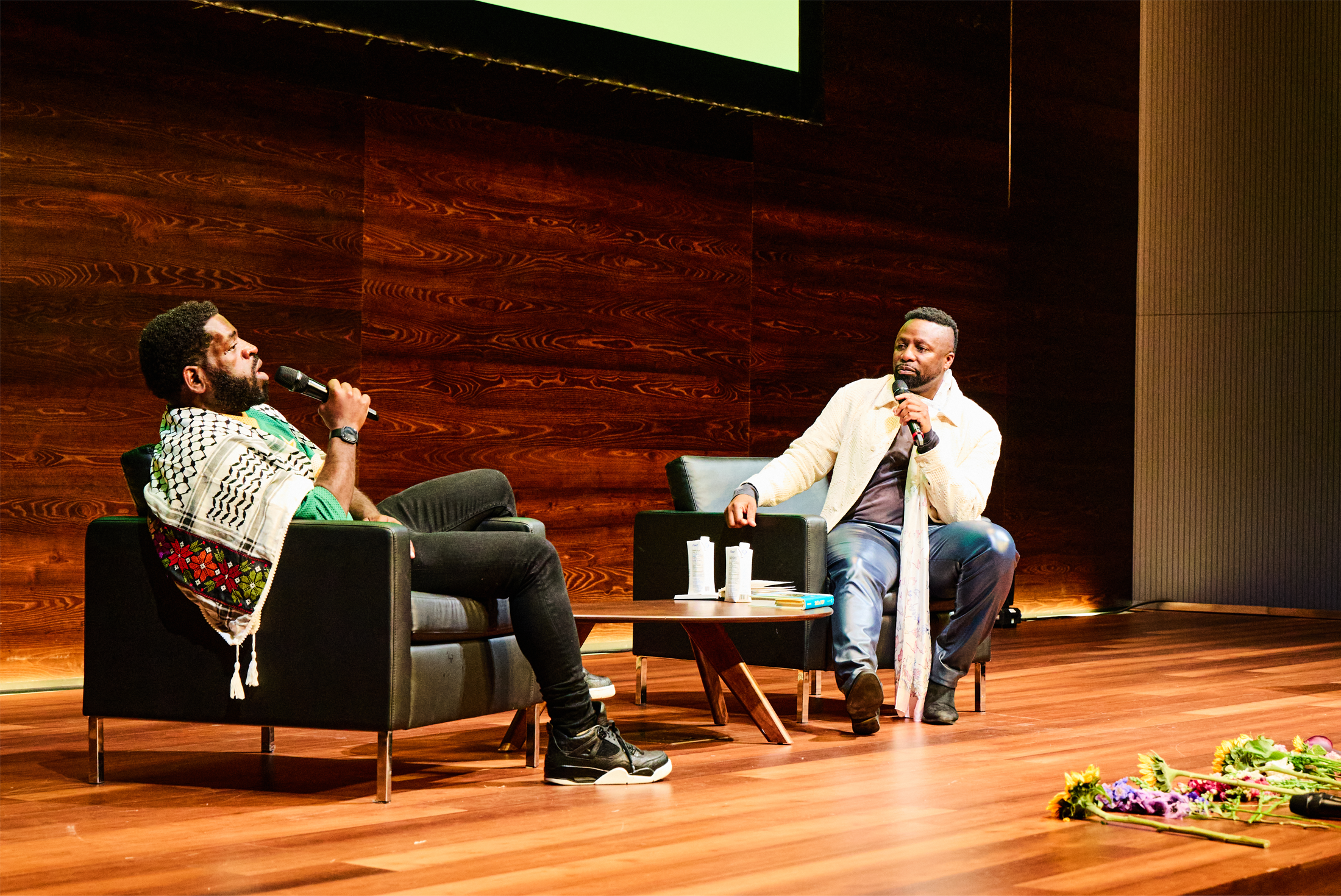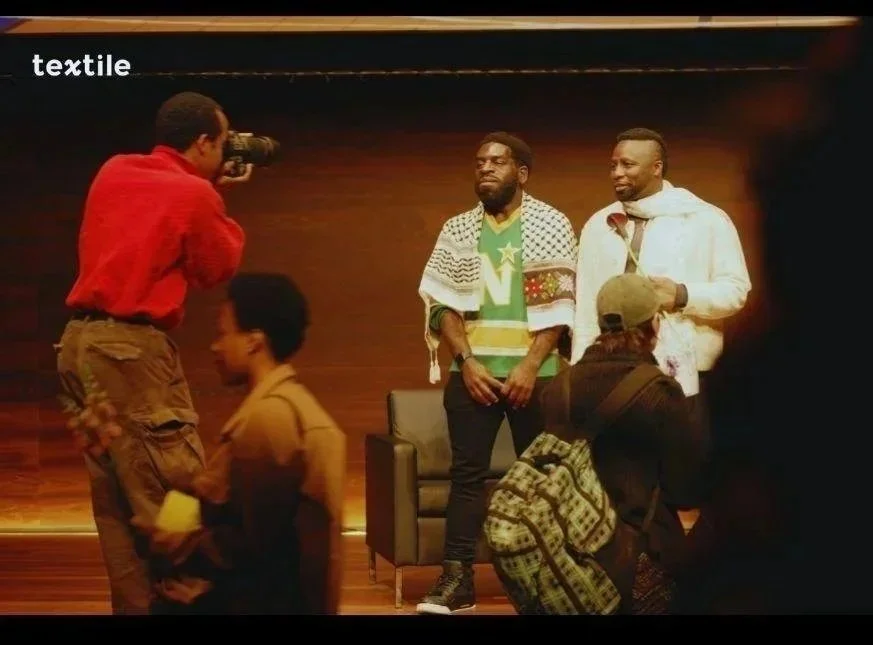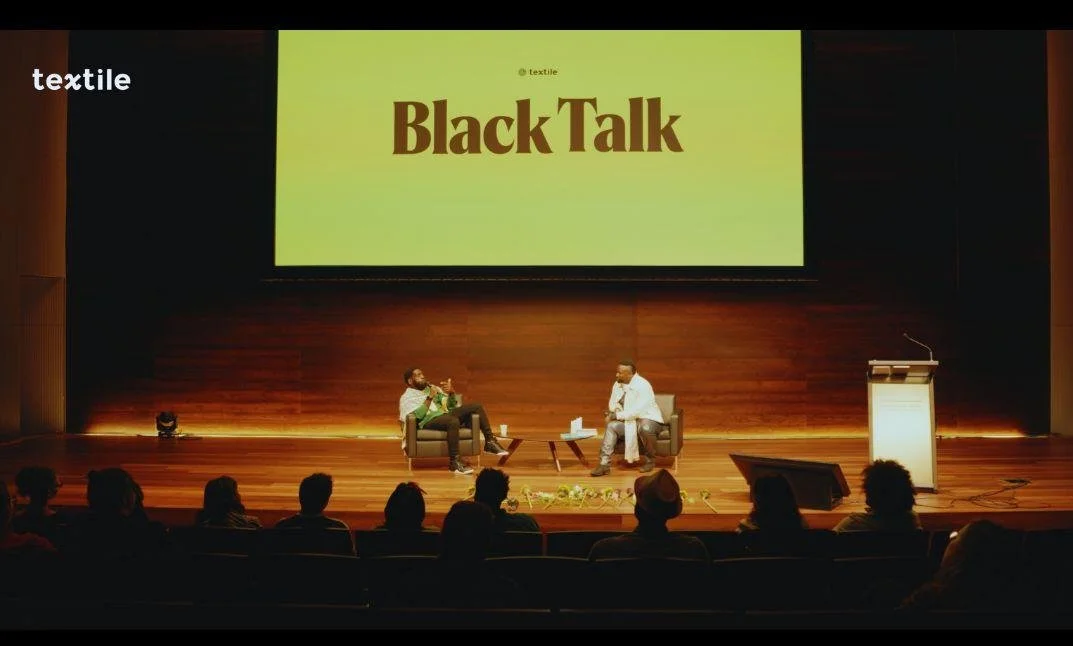MAKING LITERARY HISTORY: Textile brings award-winning authors to Waterloo Region
Black Talk event brings art critique programming to Waterloo Region
If we’re not documenting our stories, we’ll be consistently re-making ourselves and never actually grounding ourselves.
Those words from Textile’s editorial director, Teneile Warren stand tall in the context of what the hyper-local collective aims to achieve.
Textile supports emerging writers and artists in Waterloo Region, namely those from historically excluded and marginalized groups.
In September 2024, Textile transformed Waterloo Region's literary landscape by hosting Black Talk, a landmark gathering featuring New York Times bestselling author and MacArthur Fellow Hanif Abdurraqib in conversation with acclaimed Kitchener-based author Antonio Michael Downing.
Hanif Abdurraqib and Antonio Michael Downing on stage at Textile’s inaugural Black Talk event in September 2024. The event was held at Waterloo’s CIGI Campus and supported by Waterloo Region Community Foundation. Photo taken by Jordan Berhe.
“Textile is really the result of my many years of working in community, the non-profit space, and the social service space, and realizing that there was a real gap of programming and opportunities for people to express themselves creatively, to explore artistic endeavors, and to be encouraged to tell their stories. Black Talk specifically addresses a recognized gap in local programming while positioning Waterloo Region as a hub for engaging contemporary literary and cultural events”
Rooted in community, Textile’s core tenets include ensuring all the collective's work happens in the region, that time and space are made for mentorship, and that production spans a range of formats including literary and artistic creations, print and digital publishing, and curated exhibitions and events.
One such event is Black Talk, produced and presented by Textile in September 2024.
The inaugural event was held at Waterloo’s CIGI Campus. It was a free event that required registration, and they sold out within days of ticket release.
The program included readings and a critical discussion on shaping identity, the weight of excellence as expectation, and the relationship between the arts and culture, space and place, and Black life.
Guests included award-winning American poet, essayist, and cultural critic, Hanif Abdurraqib, along with Antonio Michael Downing, an author, speaker, and musician who was raised in Waterloo Region.
“From a Textile standpoint, it represents something that we’ve been building towards, which is introducing a level of professional art critique programming that has not been seen in the region,” said Warren, who emceed Black Talk. “That was important to us, one, to recognize that we are producing that level of art here that's represented in Antonio Michael Downing. And that we have an audience and a community that is not only worthy of but is engaging with critical art on a global level. Then you have Hanif Abdurraqib coming into this space, and not only were we able to fill the space, but we had a wait list.”
Black Talk was supported financially through Waterloo Region Community Foundation (WRCF)’s Arts Grants Fund, which supports small or medium-sized arts organizations and collectives. The event achieved remarkable impact, with post-event evaluation showing that 85% of respondents reported the event fostered belonging, while 100% noted it stimulated critical thought. These outcomes directly align with WRCF’s investment in strengthening community connections and social infrastructure in the region.
“There was an element of grounding before connecting that was embedded in the event,” Warren said, referring to Textile’s Black community reception, featuring a Guelph-based DJ set by Elaquent, an artist who specializes in Black cultural soundscapes, and catering from local Black-owned businesses, Vanessa’s Cuisine and Jijo’s Kitchen and Grill.
Although tickets were in high demand, Textile reserved complimentary seats for community organizations and leaders, who also received copies of both authors’ books—some with handwritten notes from Hanif. “That is not something that we see across other events, but it's also something that is very core to Black culture and to art spaces, and so that was important to us as well, in formulating the event. When you want to think of it in terms of WRCF's focus on social infrastructure and social weaving, it's recognizing that we are a community of movement.”
WRCF has researched social infrastructure over the past few years and found a framework they support that was created by Gehl Studio, which focuses on three types of activated spaces: Hubs, Havens, and Hangouts.
Black Talk is a strong example of a ‘Haven,’ a safe environment with shared identities or backgrounds to come together, fostering close ties and a sense of belonging, while not being so exclusive as to prevent connections across differences.
“The event itself, the response to the event, the people recognizing and honouring that we put effort into creating a space that centred Black care, even the people who came to the event that weren’t Black, understood that it was a gift,” said Warren.
While some initial planning is already underway for the next biennial Black Talk event in 2026, details are not yet public. This timeline allows for thoughtful development and community building between events, ensuring sustainable growth and deeper impact with each iteration. What is important, according to the organizers, is to recognize that Black Talk is much more than a one-off evening.
“It’s a conversation that never stops and the event is a moment in that conversation,” Warren said. "For us, it's less about repeating Black Talk and more about the small elements and components that bring Black Talk into community. You want to create something that people can take ownership of and engage with beyond the event itself. Even if you are not at Black Talk the event, you are participating in Black Talk. That's the vision for Black Talk.”
Highlighting the talent of Black artists and creators in Waterloo Region is critical to retaining these individuals, thus keeping these important conversations flowing.
“We have a lot of talent here. It's not an issue of whether there's talent. It exists here,” said Areguy. “I think what overwhelmingly happens is Black artists and writers in the region reach a point where they aren't able to get the support that they need to continue staying in the region, so many make the move to Toronto or elsewhere.”
“This is what it means to create public memory. To create something that is of a place, that also fills in the gaps of what’s not being told or celebrated or enshrined,” he added. “I think we’re seeing just more and more... many more Black, African, Caribbean people in the region stay and want to stay, so I hope that continues to be the case.”
Areguy considers the first Black Talk a resounding success and credited partnerships — such as with organizations like the Waterloo Public Library and Musagetes Foundation — as well as talented Textile team members Shalaka Jadhav, Teneile Warren, Natalie Vuong, and Sam Nabi.
“A huge win was realizing that we have all the skills we need to do this at a world-class level,” said Areguy.
For more information about Textile and the next iteration of Black Talk, visit textilekw.ca.
For more information on WRCF's Arts Grants Fund and social infrastructure, go to wrcf.ca/artsgrants. If you are interested in learning more about social infrastructure, visit wrcf.ca/socialinfrastructure.



